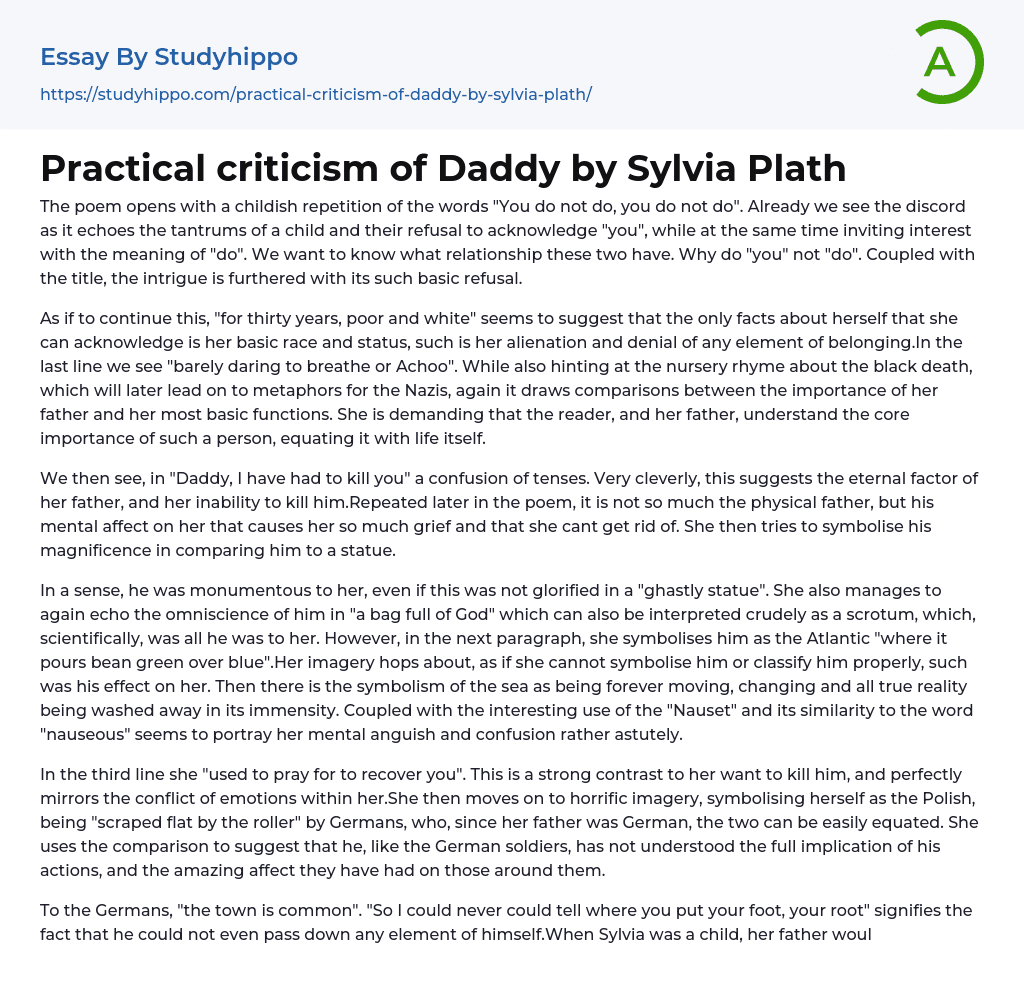

Practical criticism of Daddy by Sylvia Plath Essay Example
At the beginning of the poem, there is a childlike repetition of the phrase "You do not do, you do not do". This creates incongruity reminiscent of a child's tantrum and their failure to recognize "you". However, it also generates interest in the meaning of "do" and the connection between the two. The title further intensifies this curiosity due to its straightforward refusal.
The phrase "for thirty years, poor and white" implies that the only aspects of herself she acknowledges are her race and status, indicating a strong sense of isolation and denial of any sense of belonging. The final line alludes to the nursery rhyme about the black death, foreshadowing further metaphors for the Nazis, while also drawing a comparison between the importance of her father and her most basic bodily functions. She emp
...hasizes the significance of such an individual to both the reader and her father, equating it with the essence of life itself.
The poem "Daddy, I have had to kill you" cleverly utilizes tense confusion to suggest the eternal presence of the speaker's father and her inability to kill him. This is repeated later in the poem where it is not the physical father, but his impact on the speaker's mental state that causes her distress. Despite this, she attempts to symbolize his greatness by comparing him to a statue.
Although not in the form of a "ghastly statue", he held a monumental place in her heart. She expressed his omniscience through the metaphorical depiction of him as "a bag full of God", which could also be interpreted vulgarly as a scrotum- scientifically, that's all he was to her. However, he
portrayal of him as the Atlantic Ocean- "where it pours bean green over blue"- suggests her inability to symbolize or categorize him properly due to the profound impact he had on her. The sea's symbolism of constant movement, change, and the washing away of true reality contributes to this perception. Additionally, the use of "Nauset", which is similar to "nauseous", seems to convey her acute mental distress and confusion.
In the third line, she prayed for your recovery, which starkly contradicts her desire to kill you and reflects the conflicting emotions that she experiences. She then employs graphic imagery to depict herself as the Polish people who were "scraped flat by the roller" under German occupation. This comparison implies that, like the German soldiers, you have failed to grasp the full impact of your actions and the profound effect they have had on those around you, particularly since your father is also German.
To Germans, the town is ordinary, and to Sylvia, her father's refusal to acknowledge her is akin to refusing to pass down a part of himself. When she was young, he avoided contact with her because he feared passing on his non-contagious affliction. However, in doing so, he also withheld from her his knowledge, heritage, and understanding while simultaneously denying her the chance to share hers. Sylvia describes this communication breakdown as "the tongue stuck in my jaw," and bemoans the fact that she cannot even be sure where she came from or where she might step next.
The subsequent pictures display her recurring disappointment in her inability to communicate with her father. The sentence "Ich, ich, ich, ich" is a slow and harsh sound,
resembling onomatopoeia, depicting her forceful attempts to express herself. In German, the phrase means "I," and "I I I I" or "me me me me" represents her plea for affection. Surprisingly, in "I thought every German was you," she could imply that she viewed every male figure as her father because of his minimal impact on her life. Her flawed comprehension of love prompts her to find "the language obscene" as it lacks any demonstration of empathy or affection. Furthermore, in the ensuing stanza, she draws a parallel between Germans and the horrifying visuals of Jews confined in concentration camps.
Attempting to convey the pain caused by her partner, she is pushing boundaries with her choice of imagery. The repeated mention of different concentration camps creates a chilling and emotionless tone, while the phrase "chuffing me off like a Jew" highlights the complete estrangement between the two individuals. This theme of disconnection continues in "With my gypsy ancestress and my weird luck and my Taroc pack," where the protagonist's confusion stemming from her lack of history worsens her prospects for the future, relying only on fleeting chances such as tarot packs.
- Book Summary essays
- Metaphor essays
- Reader essays
- Rhyme essays
- Literary devices essays
- Villain essays
- Books essays
- Genre essays
- Literary Criticism essays
- Writer essays
- Protagonist essays
- Simile essays
- Poem essays
- Book Report essays
- Book Review essays
- Greek Mythology essays
- Plot essays
- Tragic Hero essays
- Coming of Age essays
- Play essays
- Rhetoric essays
- Rhetorical Question essays
- Translation essays
- Understanding essays
- Reason essays
- Character essays
- Letter essays
- American Literature essays
- Literature Review essays
- Utopia essays
- Poetry Analysis essays
- Dante's Inferno essays
- Between The World and Me essays
- Incidents in The Life of a Slave Girl essays
- Flowers for Algernon essays
- Myth essays
- Everyday Use essays
- Boo Radley essays
- Genesis essays
- Richard iii essays
- Alice in Wonderland essays
- On the road essays
- Ozymandias essays
- The Nightingale essays
- Holden Caulfield essays
- Animal Farm essays
- 1984 essays
- A Hanging essays
- Shooting An Elephant essays
- A Tale Of Two Cities essays



